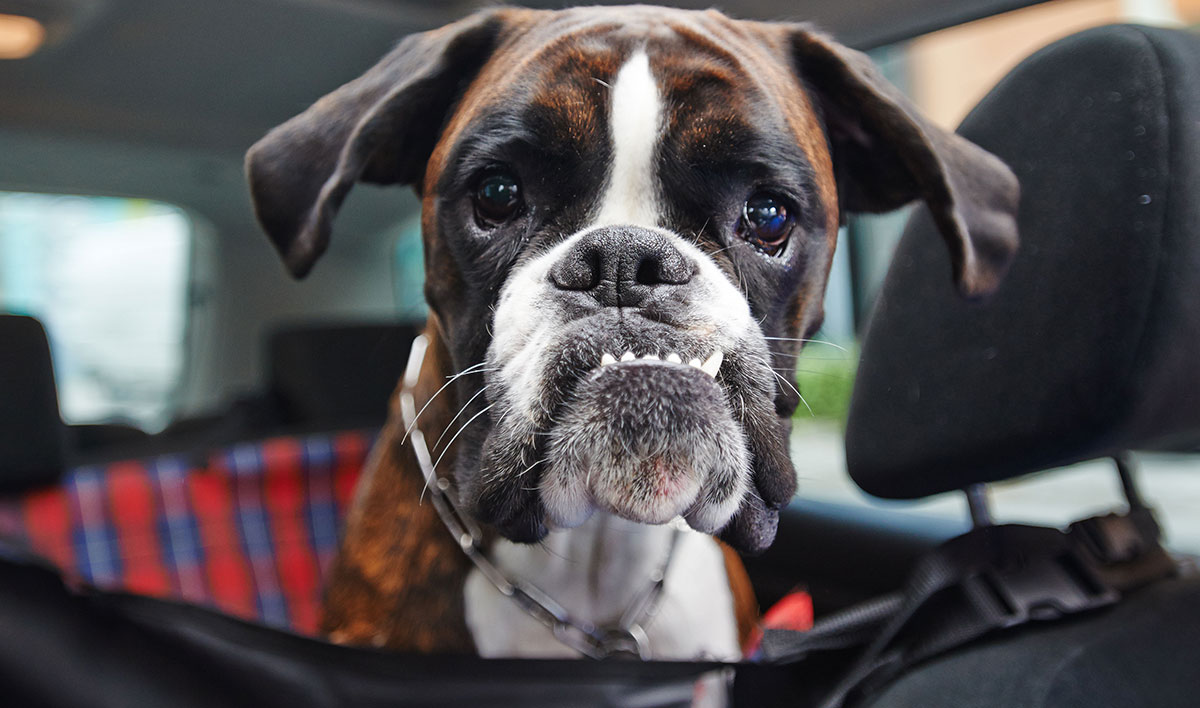
Boxer – Working

Image: larstuchel/Shutterstock.com
| Name | Boxer - Working |
|---|---|
| Size | Large |
| Grooming | Easy |
| Training | Moderate |
| Exercise | Daily / 2 hours a day |
| Origins | Germany |
Possibly Germany's Best Export
The Boxer is one of the most fun dog breeds to have around.

Image: onixxino/shutterstock.com
Everyone’s Favourite Goofball Dog
Quick Overview
Name: The Boxer
Size: Up to 25 inches tall
Weight: Up to 75 lbs
Grooming: Not often but will shed
Exercise: More than 2 hours a day
Training: Reasonably easy
Temperament: Friendly, playful, loving
Lifespan: 9-15 years (large breed)
Origins: Germany
Breed Type: Working
Some Boxer Breed History
If you are considering a boxer puppy as your doggy companion of choice, then you have a refined taste in big dogs. They are as happy guarding you against attack as they are playing with the toddler in the back yard. Boxers are notorious big softies, even although they can be fierce if trained. For this reason, they are often kept as guard dogs… but it wasn’t always so…
The boxer dog was bred from the Old English Sheepdog, which was imported to Germany around the 1850s. Their other parent was the Bullenbeisser from Germany, but this breed sadly no longer exists. This dog was a mastiff, which ultimately birthed the boxer in the late 19th century. They came from Brabant in Belgium, themselves.
In 1894, three men sought deliberately to enlist the boxer in dog shows, although up until this point the boxer was a prime fighting dog. They were bred predominantly for their temperaments in those early days. They had to be ferocious in the cage and soft and gentle with their families. This temperament selectivity led to a breed that were eager to please their human masters – but that aren’t always the nicest when it comes to other dogs.
The Boxer Exhibition
The first-ever boxer exhibition was in Munich, in 1894, and the breed standard was set thereafter. However, the boxer’s tail was not told yet. During WW1 they proved themselves to be some of the most reliable working dogs available. They are not skittish, are eager to please, and long to protect their masters. The allied forces used plenty of them as messengers and guard dogs. While other breeds faced extinction after the First World War, the boxer managed just fine. In fact, soldiers took them home with them, introducing the boxer to a new life as a companion/guard dog to people all over the world.
Fun Facts About All Boxer Puppies!
There are loads of fu things you ought to know if you are considering becoming the proud owner of a boxer puppy. The first? How big they are going to get. The rest? Here are Five Minutes Spare favourite fun things about the boxer dog breed:
- Nowadays, you will find a breed standard in the AKC, the UKC, and the UKKC, so you will never lack a club to join.
- The boxer’s ancestors are from the high mountains of Tibet, where hardy fighting dogs were bred for entertainment.
- Boxers would do anything for their masters, including carrying their packs through wartime France!
- The name ‘boxer’ is taken from the way they play, often coming up onto their back legs. Its dual-purpose would have been the ring fighting they would have done in their early days.
Are Boxers Hard to Train?
Absolutely not. They can be stubborn in that they want to protect you. This can lead to a dog that doesn’t let others near you or that is aggressive towards other pups. To get around this, socialise them as much as possible by frequent visits to the dog park. You should also enrol them in obedience training as soon as is possible, too. Good recall is essential when your dog is big and other people assume it is evil.
Can they be Groomed?
They can and will cast twice a year regardless of how much you groom them. They don’t really need brushed, although it can be done to keep shedding down and as a bonding tool. They will need their claws trimmed once in a while and are likely to need their teeth brushed weekly which as proud owner, gives you the honour. If you are reluctant to cut their claws by yourself, you can always get the vet to do it on your behalf.
Should I Exercise My Boxer More than An Hour A Day?
Yes, as often as possible. They are both high energy breeds and former working breeds, this means they have loads of extra energy that needs burning off, every single day. If you can’t commit to two large walks a day, then don’t get a boxer because they will chew holes in your couch through boredom. Plenty of toys will help to keep those teeth busy, too.
Are they a Healthy Breed?
Unfortunately, the boxer breed has had a couple of hundred years now to pick up a few defects, although these are mostly bred out of the dogs over time. The existing conditions are mostly based around cancers, heart conditions and epilepsy. They are big dogs, so you need to be aware of stomach flips in their later years. Allergies, eye problems and hip dysplasia are all common in the boxer breed. Having said that, a breeder won’t continue to breed an unhealthy dog… which is why we avoid buying from puppy farms.
Where Can I Buy a Boxer Puppy?
You should always buy your new dog from the shelter if you can and, since boxers are often misunderstood, they tend to show up there. You should check with your local shelter if you want to buy a boxer before you go to a breeder. Don’t buy from just any breeder, either, because puppy farming is rife. Instead, select one of the registered breeders through the local kennel club in your country. They will have been vetted and you will have access to family health records and documentation.
Not the Right Breed for You?
If you are desperately seeking your soul-doggo then have no fear. We have covered plenty of breeds over in our home pages, here at Five Minutes Spare. Best of all, it will only take five minutes for you to have a scour through the details and find your ideal dog partner in crime. Don’t forget to drop us a Facebook follow if you are still searching.